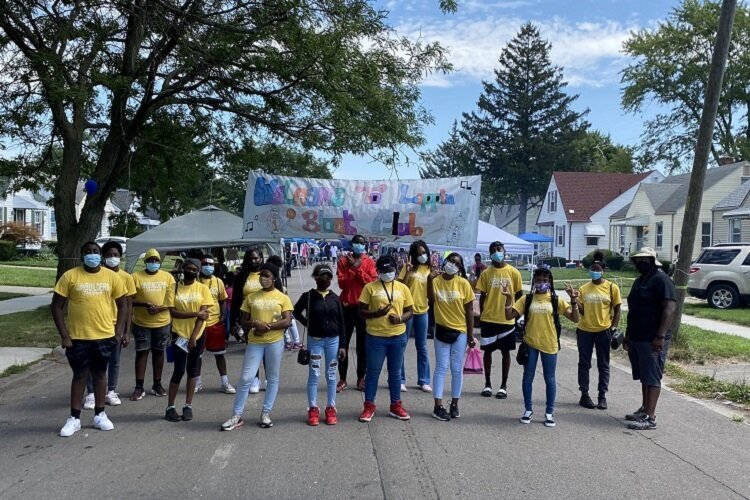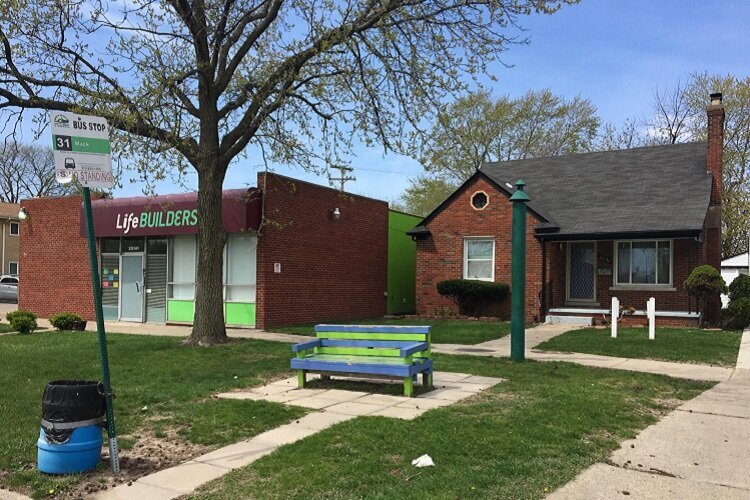Our 2021 Christmas Store was a wonderful time! Thank you to everyone who contributed to make this possible! Merry Christmas!
We had a wonderful time giving out Thanksgiving meals to so many of our neighbors this holiday season. Check out the video to see more!
by David Sands
As a resident of Detroit's Regent Park neighborhood for nearly a decade, DeAngelo Mabone has watched the area undergo an impressive transformation.
Nestled in the northeast corner of the city, the neighborhood is home to about 10,000 people living in a 76-block area, DeAngelo Mabone with his wife. bounded by Kelly Road, Seven Mile Road, Gratiot Avenue, and Eight Mile Road.
At one time, Regent Park was a relatively prosperous working-class community that was anchored by a sizable population of firefighters, police officers, teachers, and other city workers. But the community was hit hard in 1999, when former Gov. John Engler signed into law state legislation that banned municipalities from requiring employees to live within their limits via ordinances or union contracts.
That legislation had a devastating impact on the fiber of the Regent Park community, and the threads were pulled even further apart a few years later when the housing market crash hit Detroit in 2008. As a result of the neighborhood exodus, abandoned homes started to become a significant problem and blight began to creep into the community. By the mid-2000s, crime had become such a big issue there that people were referring to its ZIP code, 48205, as the most dangerous in the city.
That was the condition the neighborhood was in when Mabone, who's originally from the city's lower east side, moved to Regent Park nine years ago with his son. Since that time, though, the conditions there have rebounded.
"It's changed a tremendous amount," says Mabone. "A lot of dilapidated homes that were here, now [many of them] are occupied. And with the ushering in of more residents, more families, crime has definitely decreased."
Homicides in the 48205 ZIP code dropped from 42 in 2011 to 21 in 2018, according to Detroit Police statistics cited in the Detroit News. Similarly, the number of robberies in Regent Park dropped from 310 to 171 over the same time period.
As Mabone sees it, with fewer abandoned buildings, criminals no longer have easy access to places to squat or do illegal activities. He's also happy about some of the new amenities that have come to Regent Park over the last few years, including the introduction of several pocket parks where residents can barbecue and the establishment of an early childhood center.
He attributes many of the changes to the neighborhood over the last decade to a nonprofit organization called LifeBUILDERS, with which he's developed a very close relationship; it's a faith-based community development group that, among other things, has been very active rehabbing homes in the community.
Mabone first got involved with LifeBUILDERS through a work colleague. At the time, he'd been working with Chandler Park Academy, a charter school system based in Harper Woods.
"One of my co-workers had already been living in one of their homes," he says. "And I DJ, so they needed a DJ for one of their events. That's basically how the relationship started."
Mabone liked the work LifeBUILDERS was doing in Detroit and began to volunteer with them, helping to organize a youth development group for teenage boys. Eventually, he started renting a home from them in Regent Park for himself and his son. Two years ago, after getting married, his family moved into a three-bedroom bungalow on Eastburn Street that they're in talks to buy from the nonprofit. Mabone is now employed by LifeBUILDERS as well, working as its youth ministry director.
It's no stretch to say he's happy with the work LifeBUILDERS has done on multiple levels.
"They are an inspiration and they restore hope," he says. "They counsel people and help in any way they can. And that's definitely a step for this neighborhood."
Transforming a neighborhood
Larry Johnson and his wife, Marilyn, co-founded LifeBUILDERS in 2005 with the goal of helping residents on Detroit's east side and chose to focus its efforts in Regent Park.
"We started … out of a desire to make a difference with the rest of our life in a Detroit community," says Larry Johnson. "We picked [a neighborhood] that wasn't too far from where we were living, and just decided to see if we could help with the transformation of a whole community."
Larry Johnson with Regent Park youthThe nonprofit has certainly worn a lot of hats. For many years, it organized a summer day camp, youth employment and development efforts, and senior programming, though several of those programs are now on hold due to COVID-19. In partnership with Parkway Christian School, it also sponsors a scholarship for Regent Park Youth. But perhaps its most visible efforts have involved revitalizing the neighborhood.
Regent Park is made up mostly of brick homes — bungalows, colonials, and ranch houses — many of which were constructed in the 1950s. So while abandonment and blight have been issues in the community, there's still a lot of solid housing stock there.
Over the last 15 years, LifeBUILDERS has acquired and rehabbed 68 residential buildings in Regent Park. It owns or manages 50 of these units and has sold 16 of them to new homeowners. It's also got a purchase agreement in place for another and has held on to another as its office space. In the early days, LifeBUILDERS concentrated its housing rehab efforts on one or two projects at a time, but in the last few years, it's scaled up to larger multi-home endeavors.
It's in the process of wrapping up construction on the last house in a seven-home project funded by a combination of foundation money and a construction loan from Cinnaire Solutions. It's already sold off four of those homes to homeowners and is keeping two available to rent to tenants. It expects to complete a sale on the remaining home by the end of February.
The nonprofit is also working with the City of Detroit to complete a three-home affordable housing undertaking that's being financed with Community Development Block Grant loans from HUD and a loan from IFF. This project involves two three-bedroom bungalows on Bringard Drive and a colonial on Collingham Drive that will be sold only to homeowners making 80% or less AMI (LifeBUILDERS home on Eastburn St.Area Median Income).
The homes were pretty shabby by the time LifeBUILDERS acquired them from the Detroit Land Bank. So badly, in fact, that two had to be rebuilt almost completely from scratch.
Right now, renovations of the properties are being overseen by JJ's House Co., a Detroit-based construction company. Owner Jason Faraday says work on the homes is continuing through the winter, which can take a lot of planning and can be complicated by the need to shovel snow and set up heaters to keep workers warm.
"We did a lot of the demolition, abatement, and remediation right before the weather dropped," he says. "We're almost through the rough, which is essentially our inspection for open-wall framing and plumbing, mechanical, and electrical. Then we move into the insulation and drywall and then the finishes."
LifeBUILDERS estimates the total cost of construction, expected to wrap up in April, could run about $550,000. Looking to the near future, the organization is also planning to begin work on two new homes through a Detroit Land Bank program called The Occupied Non-Profit Program, which allows current occupants of a land bank-owned home who do not qualify for its buyback program to become homeowners.
As part of Detroit's G-7 (Gratiot and Seven Mile) neighborhood, the nonprofit has also been part of the city's strategic neighborhood fund discussions. While the priorities of Detroit's Gratiot/7 Mile Neighborhood Framework Plan are still being determined, Johnson feels there is a good possibility affordable housing projects could play a role in future plans for the area.
The community development organization's efforts certainly haven't escaped the attention of the area's city councilperson, Scott Benson, who's said he wouldn't want to imagine Regent Park without the efforts of LifeBUILDERS.
"This invaluable organization has invested in, and helped to breathe new life into the city's 48205 ZIP code," he said in a statement on the nonprofit. "It has created a friendly neighborhood by rehabbing and selling homes to young families, offering summer programs for the area's youth, and providing a free child care center for babies and toddlers. LifeBUILDERS' impact on this community is immense and immeasurable."
Housing opportunities
But what do the people who've moved into the nonprofit's homes think of their work? Sheronda Williams, who works as a cook at a nursing home, is a fan.
"I give them five stars," she says. "I was looking for someplace to live, because me and my family was homeless. We were Lappin St. Block Club staying at hotels, because we'd been through a lot. They've really been on my side since I've been there."
Williams, her husband, and their three children live in a three-bedroom brick home in Regent Park. She's appreciative of how on-top-of-things the nonprofit is in maintaining her yard and clearing snow, and has recommended its homes to several other people. Although the area was once known for crime, Williams and her family haven't run into any problems of that nature during year or so they've been in the neighborhood.
"Once I started living over there, I haven't had no issues, no police, none of that," she says. "It's decent over there. They're building up. So it's really nice."
Sheila Wiley, a lifelong resident of Regent Park, has been renting a house from LifeBUILDERS on Bringard Drive for four-and-a-half years and is looking into purchasing the home. Although the heavy traffic in the neighborhood can be a little overwhelming at times, she absolutely loves her place.
"Oh, it's a beautiful home," she says. "It's a four-bedroom, with a living room, a dining room, a kitchen, and a basement, two-car garage, and nice backyard."
Wiley lives there with her husband, disabled daughter whom she cares for, granddaughter, and niece. Like Williams, she's quite satisfied with LifeBUILDERS' maintenance of the home. Beyond that, she's also happy for her granddaughter who earned one of the nonprofit's scholarships to Parkway Christian School. As a longtime resident of the area, she also likes how they've contributed to stabilizing the community.
"They've fixed up the neighborhood, as far as abandoned houses, the vacant fields, all the garbage, and the paper," she says. "There was an abandoned school down the street. They turned it into a school for the parents who have little kids in the neighborhood. It has changed tremendously over the years."
Community developments
Over time, LifeBUILDERS has certainly played its part in addressing the issue of vacant homes in Regent Park. In 2019, the nonprofit conducted a door-by-door inspection of the northern half of Regent Park between Kelly Road and Hayes Road, East State Fair Avenue, and Eight Mile Road, where it's focused most of its work. Its survey found that of 2,000 individual parcels in that area, only 135 properties were still boarded up or open to trespass (53 of these were owned by the City of Detroit, Detroit Land Bank, or HUD). An additional 158 of these parcels were vacant lots.
But as Williams says, LifeBUILDERS efforts have gone beyond just fixing up residential properties. In partnership with IFF, and the Kresge Foundation, it helped transform the former grounds of Tracy McGregor Elementary School into an early childhood center. United Children and Family Head Start now offers educational opportunities there to local children up to the age of 5 years old.
In addition to that, the nonprofit invested $150,000 to convert a former bank branch on Kelly Road donated by JPMorganLifeBUILDERS HQ Chase in 2015 into an activity space that now serves as a center for youth activities and food distribution.
And troubled by the condition of Bringard-Boulder Park, a local recreation area that had fallen into disrepair, LifeBUILDERS approached the Kresge Foundation for assistance. That interest was rewarded with a grant that allowed them to renovate the park with amenities like athletic fields and outdoor fitness equipment. The area is now utilized by local residents for youth soccer and flag football games as well as outdoor religious revivals.
With grants from the Michigan State Housing Development Authority (MSHDA), the nonprofit has also been involved in helping local residents cover the cost of home repairs for issues like leaky roofs and damaged sidewalks.
Beyond renovation and redevelopment, LifeBUILDERS has advocated for better city services, like additional lighting and speed bumps for the neighborhood. It also initiated a neighborhood safety patrol club that's registered with the Detroit Police and works closely with Regent Park's designated neighborhood police officer.
This past year, due to the pandemic, the organization has also found itself needing to respond to the challenges of COVID-19. While it's continued its renovation work, LifeBUILDERS has also found it necessary to find ways to support the Regent Park community, especially during the first few months of crisis. With this in mind, the nonprofit held a fundraiser that raised $100,000 to provide rent relief to local residents as they waited to receive stimulus checks and the opportunity to return to work.
"This past year, we shifted everything we were doing to providing food supply and rent relief to people to help them to be able to stay in their homes," says Johnson. "We really felt called to do everything we could to keep the neighborhood stable while we waited for recovery."
All this isn't to say that LifeBUILDERS has been alone in its effort to revitalize Regent Park. Over the last decade, the nonprofit has regularly collaborated with the Regent Park Community Association, with whom it's jointly submitted numerous grant proposals over the years. It has also worked closely with two other local block clubs, the Denby Neighborhood Alliance, and other groups involved with mapping out the city's Gratiot/7 Mile Neighborhood Framework Plan.
Religious conviction has also been a strong component of the nonprofit's work in Regent Park. Throughout its time in the neighborhood, LifeBUILDERS has held music-filled revivals and brought preachers from different Christian denominations into the community to speak with local residents. And beyond these events themselves, faith has played a strong role in motivating those involved with the nonprofit and bringing the community together.
"We believe the challenges that we tackled in our community over 15 years ago were so huge that they could not be solved easily and quickly," says Johnson. "In all the work that has been accomplished, we give God all the credit for providing the resources to meet the needs of what had become an under-resourced community with the residents, in so many cases, living in despair and hopelessness as the neighborhood had fallen victim to crime, blight, and abandonment."
Original Article: Model D






